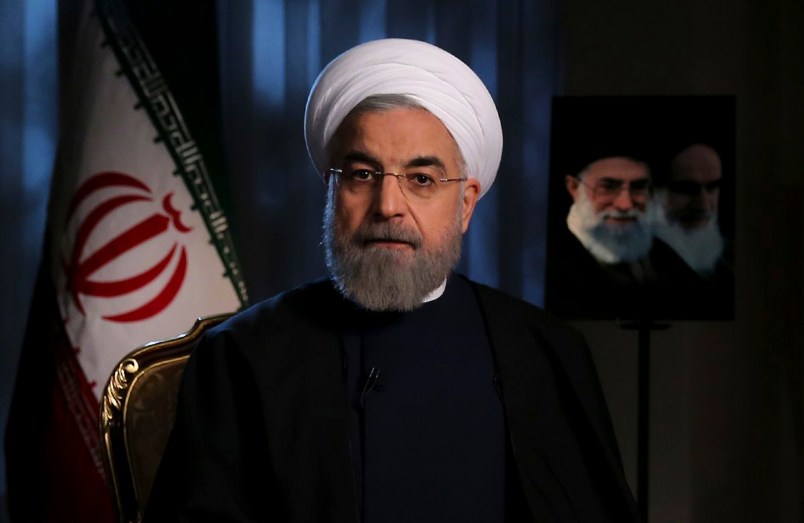TEHRAN, Iran (AP) — Iran’s President Hassan Rouhani on Friday pledged that his nation will abide by its commitments in the nuclear agreement reached the previous day in Switzerland.
Rouhani also called on world powers to fulfill their part of the deal, a reference to further lifting of sanctions imposed on Tehran over the controversial nuclear program.
“Everything we promised in the nuclear talks … we will remain loyal (to) and stand by our promises,” Rouhani said in a speech to the nation about the framework agreement. Iranians “do not seek to deceive” the international community, he added.
After a week of grueling negotiations, Iran and the six world powers announced a series of understandings on Thursday on how to curb Iran’s nuclear program. They face a June 30 deadline for a final deal that is meant to cut significantly into Iran’s bomb-capable technology while giving Tehran quick access to assets and markets blocked by international sanctions.
The deal was met with criticism by Iranian hard-liners but was overwhelmingly backed by the establishment.
Iran’s Foreign Minister Mohammad Javad Zarif, who negotiated the agreement in Lausanne, Switzerland, received a hero’s welcome upon his arrival back to Tehran on Friday.
Crowds of cheering supporters surrounded Zarif’s vehicle and chanted slogans supporting him and Rouhani. One of the chants also offered sarcastic “condolences” to both Israel and to the hard-line Kayhan newspaper, which has opposed the negotiations from the start.
Zarif tried to reassure Iranians that the country’s nuclear program will continue but said any negotiation requires give and take. “It is not supposed to be one party receiving all the concessions and the other party surrendering,” he said.
Zarif also expressed his gratitude for the support of Iran’s Supreme Leader Ayatollah Ali Khamenei and said Thursday’s understandings will be a “base for drafting the final agreement,” in July.
If implemented, the deal will substantially pare back some Iranian nuclear assets for a decade and restrict others for an additional five years. It would be the first significant success for the United States and its partners in more than a decade of diplomatic efforts focusing on capping Tehran’s nuclear advance.
Like Zarif, Rouhani also sought to reassure Iranians that the country will continue to enrich uranium — something it has always insisted was for peaceful purposes only but which the U.S. and its allies suspected was a cover for pursuing nuclear arms.
“Our enrichment and entire nuclear technology is only for the development of Iran,” Rouhani said. “It will not be against regional countries or against the world.”
A new chapter of “cooperation with the world” will begin when the final deal goes into effect after July, Rouhani added.
“Some think we have no option except to fight the world or to surrender. But there is a third way, too. We have to have cooperation with the world,” said Rouhani.
Iranian hard-liners claimed the agreement was a bargain for the West and a disaster for Iran.
“We gave up a race-ready horse and we got in return a broken bridle,” Hossein Shariatmadari, a Khamenei adviser and Kayhan’s chief editor, told the semi-official Fars news agency.
Another conservative analyst, Mahdi Mohammad, referred to the Fordo underground uranium enrichment facility and told the news outlet that under the deal, “a disaster happened in Fordo.”
As part of the Lausanne understandings, Iran agreed to stop enrichment at Fordo and change the facility to a nuclear research center.
Another member of the negotiating team — Ali Akbar Salehi, the head of Iran’s atomic agency — said, “I see the future very bright and shining.”
Ahmad Tavakkoli, a prominent conservative lawmaker, wrote a letter to Rouhani on Thursday, saying the agreement needs ratification by the country’s conservative-dominated parliament.
But supporters of the negotiations have claimed that the nuclear talks have been conducted under the direct supervision of Khamenei, and therefore don’t require parliamentary approval. Khamenei, who has final say on all state matters, has not made any public comment on the deal.
Copyright 2015 The Associated Press. All rights reserved. This material may not be published, broadcast, rewritten or redistributed.







President Obama schooled the GOP on the power of engagement and sanctions to accomplish results without unnecessary war, like the great Republican Eisenhower schooled them to “beware the military-industrial complex” more than half a century ago. When Bush took office, Iran had zero centrifuges. Bush declined to engage Iran, and Iran built thousands of centrifuges capable of enriching uranium.
Yet the self-interested Cheney claims Obama is worse than Bush?! History’s judgment will be far different, I think.
If the UK and Argentina concur, hardline warmongers from every state and nation should be quarantined in the Falkland Islands for the good of the entire world.
I think Cheney deserves Antarctica, but the penguins don’t deserve him, so Falklands is OK.
The republicans say “Don’t trust Iran.” Yet at the end of the cold war Reagan said "Tear down this wall. I think the USSR (1000’s of nukes even today in Russia) was a LOT more scary for over 50 years that Iran has been with ZERO nukes. They could build a weapon in short order . With this deal they won’t be able to.
Bibi Netanyahu says Iran must lose all nuke capability including for electricity. Fine then, Israel should lose their nukes and reactors too.
Finally, someone mentions the cooperation option. It isn’t all or nothing and if Iran ever wants to join the rest of the world, Khamenei will have to agree to these terms.
Iran could actually be a very strong ally if they become part of the international community. Netanyahu’s fear mongering aside, they are a benefit in the fight against ME terrorism.